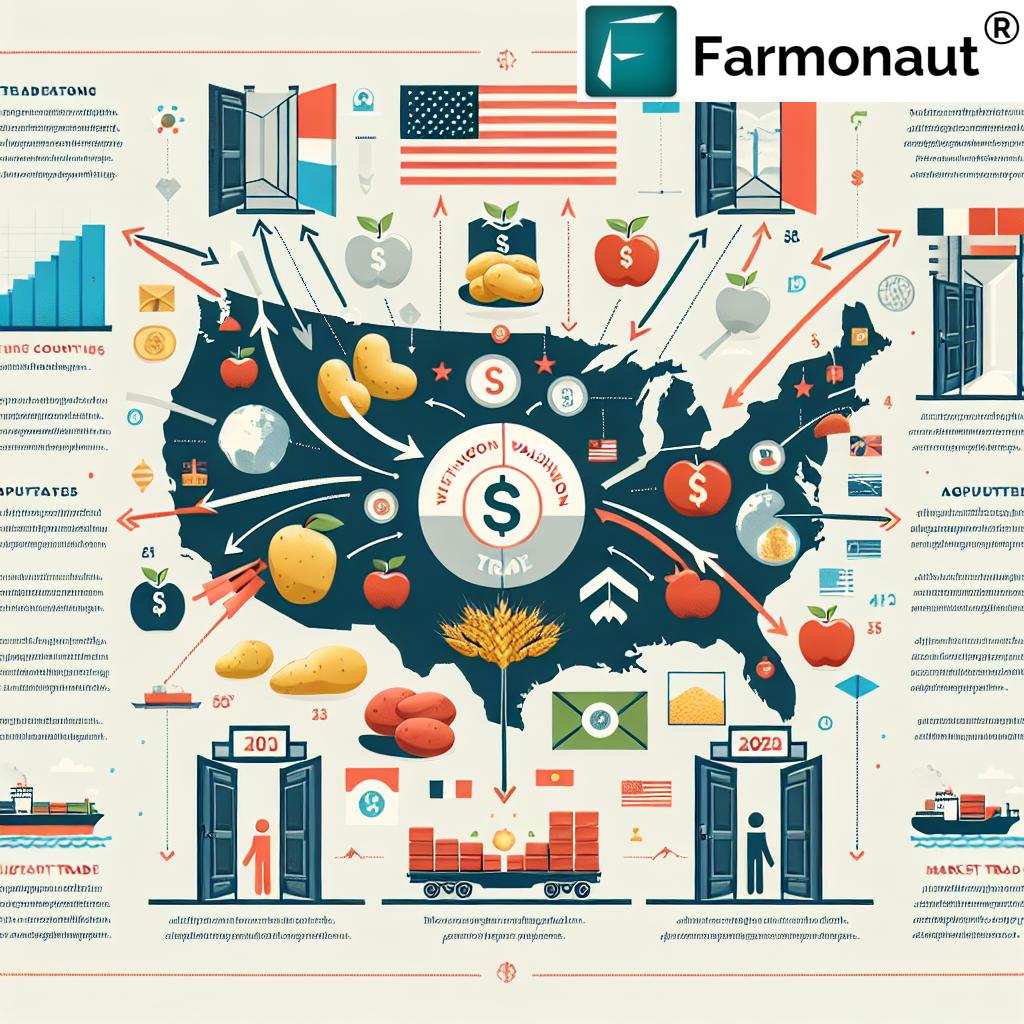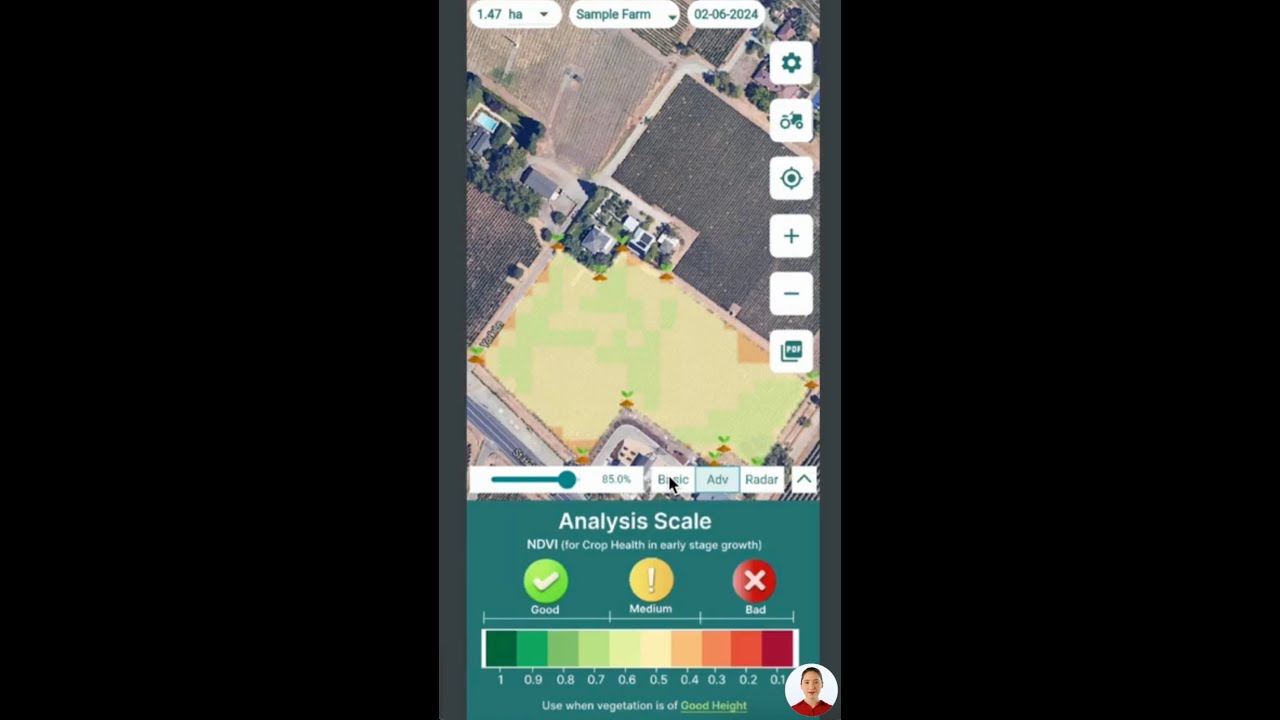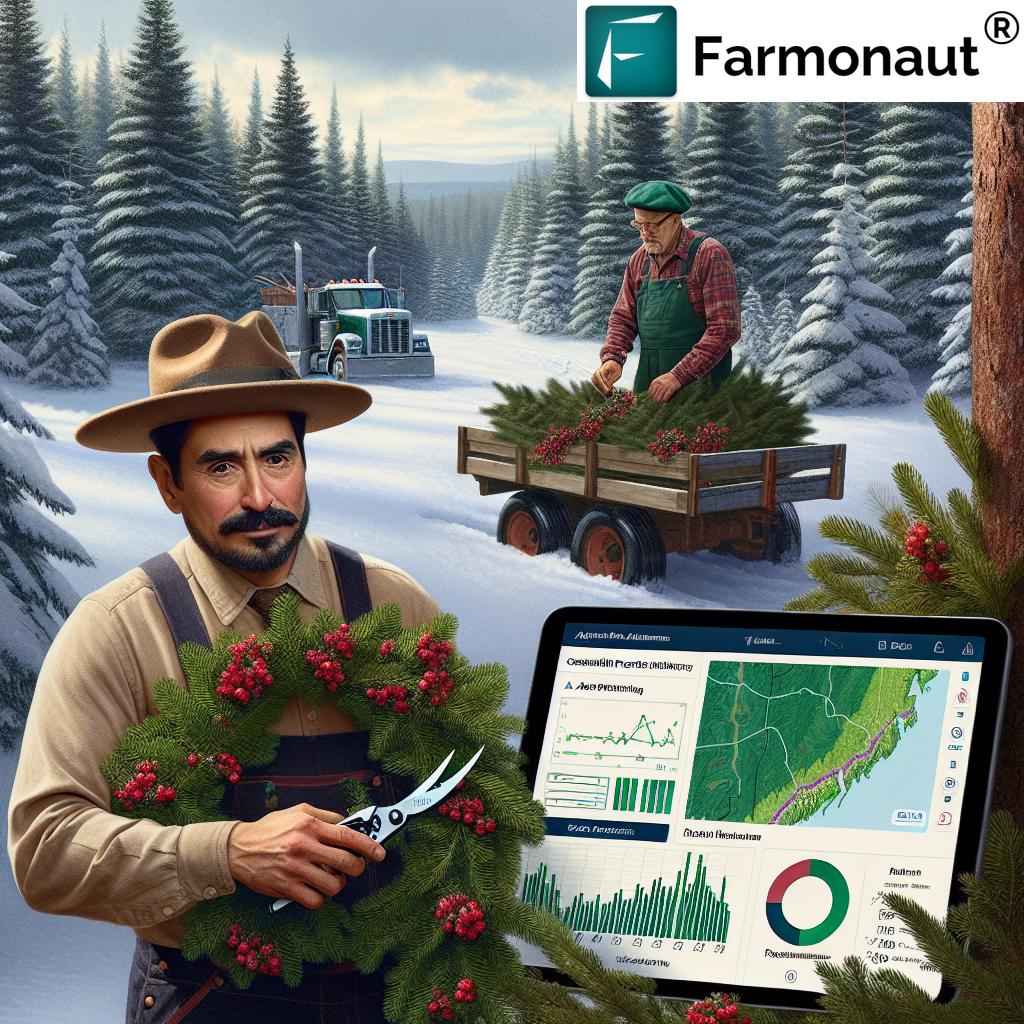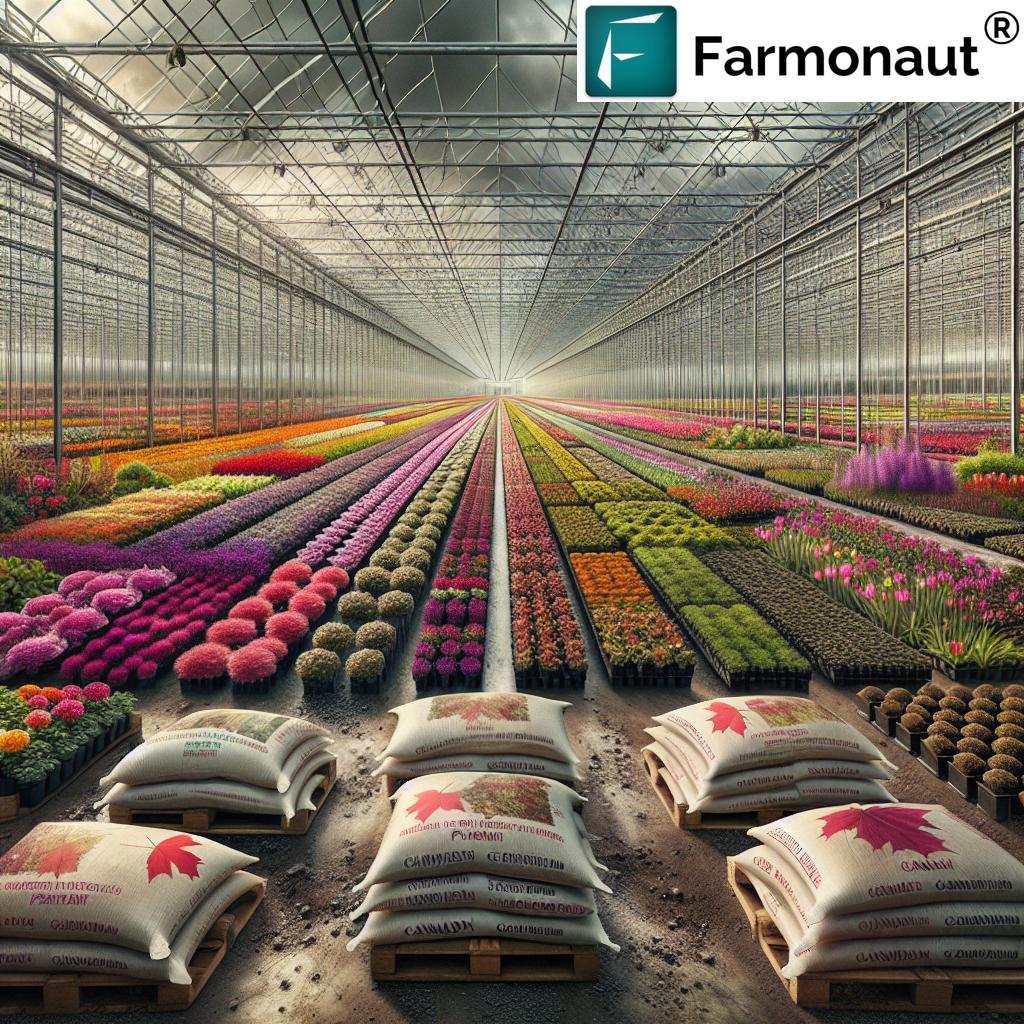Washington State Agriculture: Navigating Global Trade Challenges and Export Opportunities in 2023
“Washington state’s agricultural exports, valued at over $6.7 billion annually, face challenges due to global trade policies.”
In the ever-evolving landscape of global trade, Washington state’s agriculture sector finds itself at a crucial crossroads. As we navigate through 2023, the interplay between international trade policies, tariffs, and market dynamics continues to shape the future of our state’s farming communities. In this comprehensive analysis, we delve into the complexities of Washington state agriculture exports, exploring the challenges and opportunities that lie ahead for our farmers and agribusinesses.
The Impact of Global Trade Policies on Washington’s Agricultural Sector
Washington state has long been a powerhouse in agricultural production, with its diverse range of crops contributing significantly to both domestic and international markets. However, recent shifts in global trade policies have created a complex web of challenges for our farmers and exporters.

The imposition of steel and aluminum tariffs by the previous administration has had far-reaching consequences, triggering retaliatory measures from key trading partners. These actions have particularly affected our state’s apple industry, which has seen significant market disruptions in recent years.
The Apple Conundrum: A Case Study in Trade Dynamics
Washington’s apple industry, a cornerstone of our agricultural exports, has been severely impacted by trade tensions. The retaliatory tariffs imposed by India, once the second-largest export market for American apples, led to a dramatic decline in exports. From a thriving $120 million market in 2017, apple exports to India plummeted to less than $1 million by 2023, dealing a significant blow to our state’s more than 1,400 apple growers and the 68,000-plus workers they support.
This situation underscores the delicate balance of international trade and the profound impact that policy decisions can have on local economies. It also highlights the need for strategic approaches to trade negotiations and the importance of maintaining strong relationships with key trading partners.
Navigating Trade Challenges: A Multi-Faceted Approach
As we confront these challenges, it’s crucial to adopt a multi-faceted approach that addresses both immediate concerns and long-term sustainability. Here are some key strategies that we believe can help Washington state agriculture navigate the current trade landscape:
- Diversification of Export Markets: Reducing dependence on any single market by exploring new export opportunities in emerging economies.
- Investment in Technology and Innovation: Leveraging advanced technologies to improve productivity and competitiveness in global markets.
- Collaboration with Federal Agencies: Working closely with U.S. trade representatives to address trade barriers and negotiate favorable terms for our agricultural products.
- Sustainable Farming Practices: Adopting environmentally friendly farming methods to meet growing global demand for sustainably produced food.
In this context, innovative technologies like those offered by Farmonaut can play a crucial role in enhancing agricultural productivity and sustainability. Farmonaut’s satellite-based farm management solutions provide valuable tools for precision agriculture, helping farmers optimize their resources and improve crop yields.
The Role of International Trade Agreements in Shaping Agricultural Policy
International trade agreements play a pivotal role in shaping the landscape for Washington state’s agricultural exports. These agreements not only influence market access but also set the standards for various aspects of trade, including tariffs, quotas, and regulatory compliance.
The recent developments in U.S.-India trade relations, particularly the resolution of the apple tariff issue, demonstrate the potential for positive outcomes through persistent diplomatic efforts. This success story serves as a model for addressing other trade challenges and underscores the importance of maintaining open dialogues with our trading partners.
The Farm Bill: A Domestic Policy with Global Implications
While international agreements set the stage for global trade, domestic policies like the Farm Bill have significant implications for our agricultural sector’s competitiveness in world markets. The Farm Bill, a comprehensive piece of legislation that is renewed approximately every five years, covers a wide range of agricultural and food programs.
Key aspects of the Farm Bill that impact Washington state’s agriculture include:
- Crop insurance programs
- Conservation initiatives
- Research and development funding
- Export promotion programs
By shaping these critical areas, the Farm Bill influences not only the domestic agricultural landscape but also our farmers’ ability to compete effectively in global markets.
Opening Export Markets: Strategies for Success
In the face of ongoing trade challenges, it’s crucial for Washington state to actively pursue strategies for opening new export markets and strengthening existing ones. Some key approaches include:
- Trade Missions and Delegations: Organizing targeted trade missions to potential markets, showcasing the quality and diversity of Washington’s agricultural products.
- Digital Marketing and E-commerce: Leveraging online platforms to reach international consumers and buyers directly.
- Collaboration with Industry Associations: Working closely with groups like the Washington Apple Commission to develop coordinated export promotion strategies.
- Participation in International Trade Shows: Maintaining a strong presence at major agricultural trade events to build relationships and explore new opportunities.
These efforts, combined with supportive government policies and innovative farming practices, can help Washington state agriculture maintain its competitive edge in the global marketplace.
The Importance of Ocean Shipping Reform for Farmers
One often overlooked aspect of international trade is the critical role of transportation infrastructure, particularly ocean shipping. The recent passage of the Ocean Shipping Reform Act, spearheaded by Senator Maria Cantwell, addresses a crucial challenge faced by our agricultural exporters.
This legislation aims to:
- Crack down on skyrocketing international ocean shipping costs
- Ease supply chain backlogs that raise prices for consumers
- Make it easier for U.S. farmers and exporters to get their goods to the global market
By addressing these logistical challenges, the Ocean Shipping Reform Act provides much-needed support to Washington state’s agricultural sector, helping to ensure that our products can reach international markets efficiently and cost-effectively.
“The US-India trade relationship in agriculture impacts over $1.5 billion worth of exports from Washington state farmers.”
Embracing Technology in Agriculture: The Farmonaut Advantage
As we navigate the complexities of global trade, it’s crucial to leverage cutting-edge technologies to enhance our agricultural productivity and competitiveness. Farmonaut, a pioneering agricultural technology company, offers advanced satellite-based farm management solutions that can significantly benefit Washington state farmers.
Farmonaut’s platform provides valuable services such as:
- Real-time crop health monitoring
- AI-based advisory systems
- Blockchain-based traceability
- Resource management tools
These technologies can help our farmers make data-driven decisions, optimize resource use, and improve crop yields, ultimately enhancing their competitiveness in global markets.
The Environmental Dimension: Balancing Productivity and Sustainability
As we strive to expand our agricultural exports, it’s crucial to consider the environmental implications of our farming practices. Sustainable agriculture is not just an ethical imperative; it’s increasingly becoming a market demand, with consumers worldwide showing a preference for environmentally responsible products.
Washington state has been at the forefront of sustainable farming practices, with many of our farmers adopting techniques such as:
- Precision agriculture
- Water conservation methods
- Integrated pest management
- Soil health improvement strategies
These practices not only reduce the environmental impact of farming but also often lead to cost savings and improved crop quality, enhancing our competitiveness in global markets.
Washington State Agricultural Exports: A Comparative Overview
| Agricultural Product | Export Value (USD) | Primary Export Destinations | Trade Challenges | Export Opportunities |
|---|---|---|---|---|
| Apples | $700 million | Mexico, Canada, Taiwan | Retaliatory tariffs, phytosanitary restrictions | Emerging markets in Southeast Asia, improved US-India relations |
| Wheat | $500 million | Japan, South Korea, Philippines | Global price fluctuations, increased competition | Rising demand in Africa, potential for value-added wheat products |
| Potatoes | $300 million | Japan, South Korea, Taiwan | Market access limitations, tariff barriers | Growing demand for processed potato products in Asia |
| Cherries | $250 million | China, South Korea, Canada | Short shelf life, sensitive to trade disruptions | Expanding air freight capacity, emerging markets in Middle East |
| Dairy Products | $200 million | Mexico, Southeast Asia | Subsidies in competing countries, non-tariff barriers | Growing demand for high-quality dairy in developing economies |
The Role of Alliances and Coalitions in Trade Negotiations
In the complex world of international trade, alliances and coalitions play a crucial role in shaping outcomes. Washington state’s agricultural sector benefits from collaborative efforts at both the national and international levels. By working together with other states and countries that share similar interests, we can more effectively advocate for policies that support our farmers and exporters.
Key areas where alliances are particularly important include:
- Addressing non-tariff barriers to trade
- Harmonizing food safety and quality standards
- Negotiating market access for new agricultural products
- Advocating for fair competition in global markets
These collaborative efforts can lead to more balanced and sustainable trade relationships, benefiting not only Washington state but the broader agricultural community as well.
The Future of Washington State Agriculture in the Global Marketplace
As we look to the future, the outlook for Washington state agriculture in the global marketplace is both challenging and promising. While trade tensions and policy uncertainties continue to pose risks, there are also significant opportunities for growth and innovation.
Key trends that are likely to shape the future include:
- Increased demand for high-quality, sustainably produced food
- Growing importance of traceability and food safety
- Expansion of e-commerce and direct-to-consumer channels for agricultural products
- Adoption of climate-smart agricultural practices
By staying at the forefront of these trends and continuing to innovate, Washington state’s agricultural sector can maintain its competitive edge and thrive in the global marketplace.
Leveraging Technology for Agricultural Success
In an era of rapid technological advancement, leveraging cutting-edge solutions is crucial for maintaining Washington state’s agricultural competitiveness. Farmonaut’s innovative platform offers a range of tools that can significantly benefit our farmers:
- Satellite-Based Crop Health Monitoring: Enables real-time tracking of crop health, helping farmers make informed decisions about irrigation, fertilizer use, and pest management.
- AI-Powered Advisory System: Provides personalized recommendations based on data analysis, improving farm productivity and efficiency.
- Blockchain-Based Traceability: Enhances supply chain transparency, meeting growing consumer demand for product origin information.
- Resource Management Tools: Helps optimize the use of water, fertilizers, and other inputs, reducing costs and environmental impact.
By incorporating these technologies, Washington state farmers can enhance their productivity, reduce costs, and better position themselves in the global marketplace.
Explore Farmonaut’s API for advanced agricultural data integration
The Interconnectedness of Agriculture, Commerce, and Global Markets
The story of Washington state agriculture is a testament to the intricate connections between local farming communities, national policies, and global market dynamics. Decisions made in Washington D.C. ripple through our farmlands, affecting everything from crop choices to export strategies.
Key aspects of this interconnectedness include:
- The impact of trade policies on farm income and rural economies
- The role of agricultural exports in maintaining a balanced trade portfolio
- The influence of global market trends on local farming practices
- The importance of agriculture in broader economic and diplomatic relations
Understanding and navigating these connections is crucial for developing strategies that support our agricultural sector while also contributing to broader economic and diplomatic goals.
Conclusion: A Path Forward for Washington State Agriculture
As we navigate the complex landscape of global trade challenges and opportunities, Washington state’s agricultural sector stands at a pivotal juncture. The resilience and innovation of our farming communities, coupled with strategic policy approaches and technological advancements, will be key to our continued success in the global marketplace.
By embracing sustainable practices, leveraging cutting-edge technologies like those offered by Farmonaut, and actively engaging in trade negotiations, we can ensure that Washington state agriculture not only survives but thrives in the face of global challenges. The path forward requires collaboration, adaptability, and a commitment to excellence – qualities that have long defined our agricultural heritage.
As we look to the future, let us remain committed to supporting our farmers, fostering innovation, and working together to build a resilient and prosperous agricultural sector that continues to feed the world and drive our economy forward.
FAQ Section
Q: How have steel and aluminum tariffs affected Washington state’s agricultural exports?
A: The imposition of steel and aluminum tariffs led to retaliatory measures from trading partners, particularly impacting the apple industry. For example, apple exports to India dropped from $120 million in 2017 to less than $1 million by 2023.
Q: What role does the Farm Bill play in Washington state’s agricultural exports?
A: The Farm Bill shapes critical areas such as crop insurance programs, conservation initiatives, research funding, and export promotion programs, influencing farmers’ ability to compete effectively in global markets.
Q: How is technology helping Washington state farmers navigate global trade challenges?
A: Advanced technologies, like those offered by Farmonaut, provide tools for precision agriculture, crop health monitoring, and resource management, helping farmers optimize production and improve competitiveness in global markets.
Q: What are some key strategies for opening new export markets for Washington state agricultural products?
A: Strategies include organizing trade missions, leveraging digital marketing and e-commerce, collaborating with industry associations, and participating in international trade shows.
Q: How does the Ocean Shipping Reform Act benefit Washington state farmers?
A: The Act aims to reduce international ocean shipping costs, ease supply chain backlogs, and make it easier for U.S. farmers and exporters to get their goods to global markets more efficiently and cost-effectively.
Earn With Farmonaut
Earn 20% recurring commission with Farmonaut’s affiliate program by sharing your promo code and helping farmers save 10%. Onboard 10 Elite farmers monthly to earn a minimum of $148,000 annually—start now and grow your income!
Learn More About Farmonaut’s Affiliate Program
Farmonaut Subscriptions





















